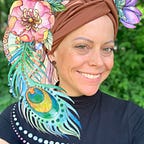Living Two Lives
I live two lives. One is leaning towards reality, one towards delusion. Between the two lives stand zombies.
It’s a sunny Tuesday morning in Milwaukee, Wisconsin. After the heavy rain last night, the air is crisp, and the scent of Canadian goldenrod tickles my membranes. Shyly, I open the top floor window to take a well-earned, deep breath, when suddenly, I hear some growling. I close the window again immediately.
Whatever.
I put on my goldenrod-colored, fair trade silk rope and go downstairs into the sunlit kitchen. While I look out the window and wallow in the peace of my beautiful garden, the oven is preheating for my favorite part of my day: a croissant.
If I were the last person on this planet, I would eat croissants all day long.
All day long… my mind lingers on this fantasy for a bit.
Oh, wait.
I remember.
To my knowledge, I am the last person on this planet.
And with that thought, the kitchen door shatters, and I am welcomed by hundreds of mindless, half-human creatures that recently started walking this earth, turning everything that was once human and flourishing into the undead. I don’t know where they came from, and I don’t think even God (?) knows where they are going.
Why me?
Let me eat my croissant first.
…were the last thoughts I remember to have crossed my conscious mind.
But they had no mercy. Within seconds they devoured parts of me. And soon after, I was one of them — a mindless, half-human creature walking this earth.
Diaries of a Zombie
Maybe I will continue those “diaries of a zombie.” If I did, the zombie-me would be a bit different from the zombies that Vervaeke, Mastropietro, and Miscevicand describe in their book Zombies in Western Culture: A Twenty-First Century Crisis. Within the book, they explain one characteristic of the zombie is that it is mindless. It wanders around and follows its urges — eating what is alive — whether hungry or not. They describe one scene from a movie where the zombie keeps eating, although it has no gut, and the “food” falls to the floor once devoured.
It reminds me of our consumption patterns…
The zombie-me, though, would — from the outside — appear just like any other zombie. But you — seeing zombie-me — don’t know that I have a (rich) inner life that I can’t express. On some level, my consciousness would still be working, but I wouldn’t be able to act differently than all zombies around me. And although I know that what I am doing is not the way I want to live my life, I would be unable to act differently.
It would show the inner battle that I seem to have been living since I first took note that all the clothes I bought from H&M impact the environment and are unethically produced. The first time I noted that, damn — as the complex systems researcher Stuart Kauffman said — “I am the system.”
But I’d be part of that zombie system, despite the increasing wisdom that I would gain from watching my mind and the natural world closely (as I’d be undead, I’d “live” very long, which, to my advantage, would give me a lot of time to think). The challenge — my hero’s journey — would be to figure out how to move beyond this zombie-being.
Really, a zombie story?
Admittedly, using a zombie story to describe our predicament is not particularly unique and maybe even a bit ungraceful. Zombies, as Vervaeke et al. describe, “can stand for nearly every conceivable human failing.” But they go on saying that.
“Zombies do represent us, but more specifically, they represent the ruin of all that is meaningful within us. Zombies represent the modern deterioration of our uniquely human ability to make and sustain meaning in our lives. … The main function of the zombie symbol seems to express the meaning crisis.”
Very simplistically, the meaning crises, as they explain, results from a lack of coherence in worldview across society. Worldviews, also called meta-narratives, myths, paradigms, or a lived philosophy, constitute what is real and significant to us. They define our ways of life and how we relate to ourselves, each other, the more-than-human world, and the universe.
Zombie-me then would wonder, paraphrasing from Sadie Moon’s excellent book Building the Cathedral, what if our zombie communities task of all tasks would be to bring about a coherent philosophy that we can live by? How would we go about creating such a philosophy? Mainly because, as zombies, we can’t communicate with each other. I would wonder if the zombies would have the same insights. And I would ask if I — a single zombie — facing the Apocalypse can do anything about this?
